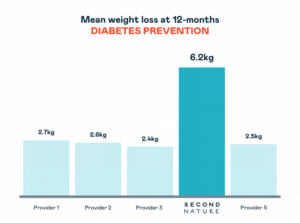Jump to: Weight Watchers weight-loss injections | The Weight Watchers approach: A crash diet? | The risks of calorie counting and strict dieting | The bottom line
We wouldn’t recommend you purchase a weight-loss injection through Weight Watchers (WW).
This recommendation might sound biased coming from Second Nature, a competitor of WW and a company also offering a medication-supported programme.
However, we believe WW’s approach to weight loss is unsustainable and can lead to years of yo-yo dieting and long-term weight gain.
This is evident in their inability to showcase effective results in national weight-loss programmes.
In 2022, they were removed from the NHS National Diabetes Prevention Programme due to poor results.
Whereas research from the same programme showed that Second Nature was the best weight-loss programme compared to four other providers.

WW is likely to continue its weight loss approach, which focuses more on short-term results and yo-yo dieting than on giving you the lifelong tools you need to lose weight for good.
So, you may be able to achieve weight loss with WW and their weight-loss injections, but you might not learn how to maintain your weight loss in the long term and regain the weight you lost once you stop the medication.
Medication-assisted weight loss with a future focus
Start with Wegovy or Mounjaro, transition to habit-based health with our support


The Weight Watchers approach: A crash diet?
WW uses a points system called SmartPoints to identify foods based on their calorie, sugar, protein, and saturated fat intake.
For example, foods high in sugar and saturated fat will be high in points, whereas most fruits and vegetables are 0 points and considered ‘free foods’.
You have a personal points target based on your current weight designed to help keep your intake lower, put you in a calorie deficit, and lose weight.
WW claims this approach is better than calorie counting and has no adverse psychological effects that people can experience when becoming obsessive about calorie counting.
However, dietitian, nutrition writer, and food psychology expert Abby Sharp delivered a scathing review of WWs new programme on YouTube titled “Dietitian Reviews Weight Watchers (YEP, IT’S STILL REALLY REALLY BAD)”.
You can watch the full video here, but here’s a quick summary of Abby’s analysis:
- The new WW is “just expensive calorie counting”.
- The points system on WW to create a ‘food budget’ is unnatural
- The ‘rolling over’ of points might mean people intentionally restrict themselves too much to then binge at the weekend
- WW promotes restriction and bingeing cycles common in people living with disordered eating patterns
- WW demonises natural, healthy high-calorie foods like Brazil nuts. If you were to enjoy 28g of Brazil nuts, you’d use up half your SmartPoints for the day.
- The points system doesn’t help you identify the quality of the foods you’re consuming. Instead, it mainly focuses on a reductionist approach to calorie density.
The risks of calorie counting and strict dieting
Strict calorie restriction risks putting your body into what’s known as ‘metabolic adaptation’. This is essentially a starvation response by your body when energy intake is very low.
This triggers a cascade of events designed to encourage you to eat more and continue to store fat. You might feel lethargic and hungry, and your mood might also experience a dip.
Because of this starvation response to strict dieting, Second Nature has taken a different approach – one where you determine what level of intake works for you, and surprisingly, it can lead to more weight loss in the long term.
Why choose Second Nature?
Second Nature currently provides Mounjaro as part of our Mounjaro weight-loss programme.
Why should you choose Second Nature over other medication providers if you’ve decided to try Mounjaro (assuming you’re eligible)?
For peace of mind.
Second Nature has worked with the NHS for over 6 years providing weight-loss programmes across the UK.
While our Mounjaro weight-loss programme is private and not currently used by the NHS, we’ve built the programmes focusing on scientific evidence, patient safety, and data security.
We hope that our 6+ years of working with the NHS and building a track record of effective weight-loss results will give you peace of mind to give us a try.
The bottom line: Short-term gain, long-term pain
WW’s approach to weight loss is unsustainable and goes against what good science has shown supports long-term weight loss maintenance.
If you buy weight-loss injections from WW, you’ll lose weight in the short term – the recent wave of GLP-1 medications like semaglutide are highly effective, and you’ll likely see success wherever you purchase it.
However, WW’s track record for supporting individuals to lose weight in the long term isn’t great, which is why the NHS removed them from their diabetes prevention services in 2022.
If you’re looking to discover how to rid yourself of a lifetime of yo-yo dieting and want to lose weight for the last time, you should consider Second Nature.


